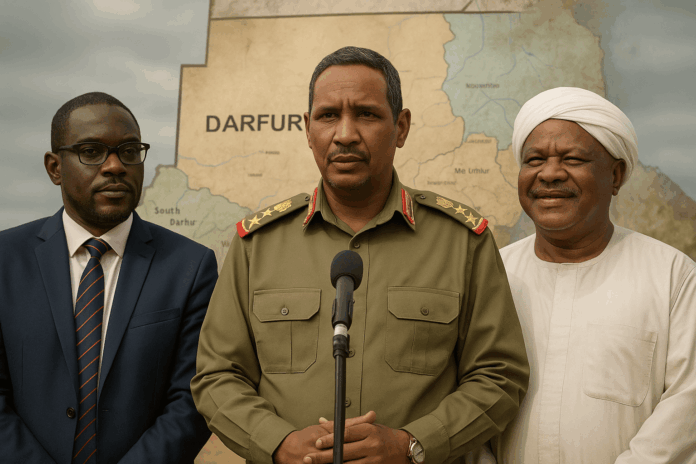The RSF parallel government in Sudan was declared on Saturday, July 26, 2025, in Nyala, Darfur, by the Rapid Support Forces (RSF) and allied factions. Branded as the “Government of Peace and Unity,” the new entity lacks any formal recognition from Sudan’s legitimate transitional government or the international community. Led by General Mohamed Hamdan Dagalo (Hemedti), with Abdelaziz al-Hilu as deputy and Mohamed Hassan al-Taishi as prime minister, this unilateral political move has sparked widespread rejection both regionally and globally.
The RSF parallel government is based on a “Founding Charter” signed in Nairobi, Kenya, in March 2025 by the Sudan Founding Alliance. The charter outlines the framework for a secular, decentralized state labeled the “New Sudan.” The RSF coalition has announced plans to issue a national ID and a new currency in areas under its control. However, these steps remain symbolic and lack any legal or international authority.
Sudan’s internationally recognized transitional government, led by Prime Minister Dr. Kamil Idris, condemned the RSF’s declaration as a direct violation of Sudanese sovereignty. Formed in May 2025, the Idris administration is supported by institutions including the United Nations, African Union, and IGAD, and is based in Khartoum. The Idris government reiterated that no parallel authority has legitimacy outside national consensus and international recognition.
Countries such as Egypt and Algeria, alongside organizations like the Arab League, UN Security Council, and African Union, have all rejected the legitimacy of the RSF parallel government. Many analysts view this as a tactical maneuver to consolidate power in RSF-controlled regions, while others warn it will only deepen Sudan’s crisis and obstruct peace efforts.
The RSF emerged from the Janjaweed militias and played a significant role in Sudan’s transitional period post-2019. However, conflict erupted in April 2023 between the RSF and Sudanese Armed Forces (SAF), resulting in a civil war that has devastated infrastructure and displaced millions. The RSF’s latest declaration is seen by observers as an escalation in their attempt to gain political legitimacy amid ongoing military tensions.
Sudan’s civil conflict has led to over 150,000 deaths and displaced more than 14 million people. With famine looming and access to aid blocked in some areas, humanitarian agencies warn of catastrophic consequences if a unified solution is not reached. International experts stress that the formation of unrecognized parallel authorities undermines peace, hinders aid delivery, and risks Sudan’s fragmentation.
The current political landscape reflects a deepening divide:
| Entity | Leadership | Headquarters | Official Recognition |
|---|---|---|---|
| Transitional Government (Recognized) | Kamil Idris | Khartoum | Internationally recognized |
| RSF Parallel Government (Unrecognized) | Hemedti, Al-Hilu, Al-Taishi | Nyala, Darfur | No national or global recognition |
The declaration of the RSF parallel government in Sudan marks a serious challenge to national unity and constitutional legitimacy. As the humanitarian crisis intensifies, political division threatens to prolong the conflict and delay recovery. Only through inclusive dialogue and internationally mediated negotiations can Sudan move toward peace and institutional stability.




